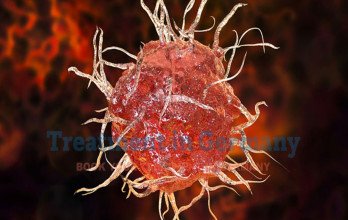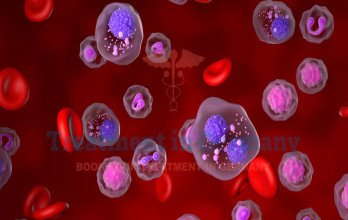
Pancreatic cancer (ICD C25) is one of the most common gastrointestinal cancers. More than 300,000 new cases are diagnosed in the world every year.

Duodenal cancer is a rare but serious malignancy that develops in the first portion of your small intestine (duodenum), accounting for less than 1% of all gastrointestinal cancers [3].

Cancer cells may break away from a tumor in the colon or rectum and spread to other parts of the body through the bloodstream or lymphatic system. These cells may settle and form new tumors on a different organ

Colon cancer (ICD C18) is one of the five most common malignant tumors in the world, ranking third overall. While the average age of most patients is 60-75 years, the disease can also develop in individuals between 35-50 years old.

Pancreatic cancer is an aggressive tumor of the digestive system. One of the reasons for the low effectiveness of treatment for pancreatic tumors is the weak anti-tumor immune response.

A Klatskin tumor, also known as perihilar cancer, is a type of extrahepatic cholangiocarcinoma, which starts in the area where the right and left bile ducts converge to form the common bile duct.

Kidney cancer, particularly renal cell carcinoma (RCC), remains a formidable challenge, necessitating innovative treatments to enhance outcomes for kidney cancer patients.

Conventional treatment for pulmonary fibrosis offers limited hope, slowing progression but never reversing damage or restoring lung function.

Kidney cancer, particularly renal cell carcinoma (RCC), is a significant health challenge requiring innovative approaches to improve outcomes for kidney cancer patients.

Lung cancer, one of the leading causes of cancer-related deaths globally, demands innovative approaches to improve survival rates and quality of life.

Dendritic cell therapy, a cornerstone of modern immunotherapy, is revolutionizing cancer treatment by harnessing the immune system to target tumors.

Dendritic cells, often dubbed the immune system’s generals, play a pivotal role in directing anti-cancer attacks, offering hope for patients battling various malignancies.

The quality ofhealthcare in some countries is not able to always satisfy the needs of its citizens. People cannot receive adequate care in severe cases or when suffering from a rare disease.

Multiple myeloma is a malignancy of plasma cells in the bone marrow, leading to bone destruction, kidney impairment, and weakened immunity.

While traditional approaches like radiation therapy and chemotherapy show limited effectiveness, modern immunotherapy has revolutionized treatment outcomes at all stages.
.webp)
.webp)
 (1).webp)
 (1).webp)

.webp)
.webp)
 (1).webp)
 (1).webp)
